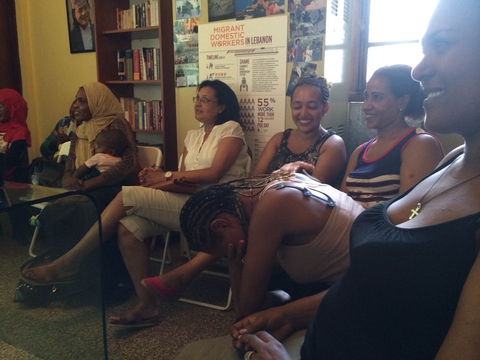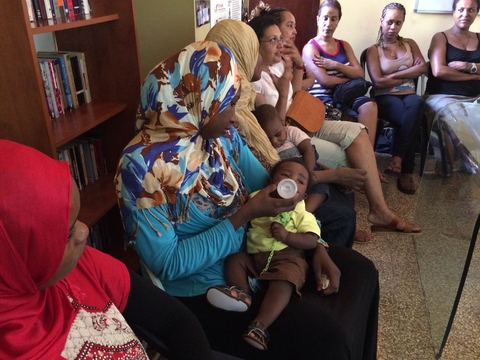Sexuality and Sexual Health Series at MCC
Over the last year, every two months we have been holding a series of community involvement discussions on sexual and reproductive health at the Migrant Community Center (MCC). These discussions are held in small groups with women from various migrant communities residing in Lebanon. So far we’ve met with six groups and plan on continuing these discussions, and hopefully expanding it to beyond MCC and Beirut.
Till now our conversations have mainly focused on female and male anatomy, conception, avoiding unwanted pregnancies and sexually transmitted infections, pleasure and negotiating the sex you want. The conversations are always about much more than health, as racism, absent labor laws, exploitation at work, the sponsorship system affects whether you can access healthcare and whether its good quality service or not. It is always beautiful to see women sitting together to discuss bodies, their bodies, intimacy and sex. There are limited spaces for women to talk openly about their sexual health and the stigma and violence (whether physical or not) they face, and especially limited for many migrant domestic workers in Lebanon whose time and mobility are restricted by their employers, security forces if she’s out of contract, and/ or by sheer exploitative work-load and responsibilities. Most migrant domestic workers in Lebanon have no defined working hours, as they’re expected to be available around the clock, and often live at their employer’s place of residence. Their access to basic rights is made difficult or restricted, placing them at a higher risk of being exploited in the already super expensive and privatized medical realm of Lebanon. Basic insurance is mandatory for their paperwork to be processed by Ministry of Labor, however its ever so often that a very weak insurance policy is drawn out, that the policy is not in the worker’s hands (so it’s difficult to use unless she’s with her employer), and that it only covers work-related injuries and is only useful in a limited number of either distant and/ or small hospitals. But even more than that, migrant domestic workers are expected or demanded to be sexless (this actual legal memo was retracted a few months after it was issued), to have zero sexual life, zero desire, zero want, zero fantasies, zero relationships, zero thoughts on the matter of sex; meanwhile many are subject to sexual harassment and violence at work, which with their work conditions, give their attackers impunity. This makes access to sexual health services even more difficult and subject to discrimination. Health, and having agency or autonomy in health related decisions - specifically sexual and reproductive health, is and has always been a political issue for most women, and we see it is even more so for those of fewer privileges.
To be able to sit together and discuss sex and health and their intersections is and of itself a political act in a country plagued by racism and discrimination over access and rights. Moreover, the content of our conversations is always shaped to be read politically, we discuss all the possible contraceptive methods we know, yet need to always mention how many are made unavailable or too expensive, and how all contraceptive methods except the male condom and vasectomies (which are almost inconceivable to the all mighty man) are directed at women’s use, women’s responsibility, and if/ when it fails – women’s mistake.

